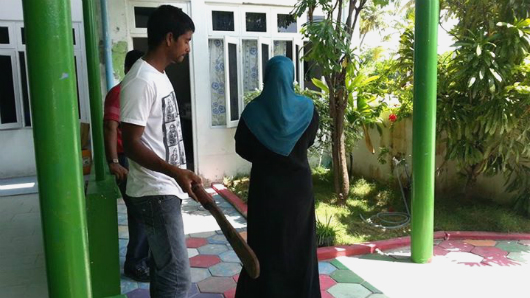The Maldives has defended the death penalty for murder and flogging for fornication at a UN human rights review on Wednesday, stating the punishments are mandatory in Islamic law.
Several countries including France, the United Kingdom, Ukraine, Namibia, Spain, Australia and Montenegro expressed concern over Maldives’ decision to end a six-decade moratorium on the death penalty last year.
However, speaking to the UN human rights council in Geneva, legal affairs secretary Aishath Bisham said: “We would like to stress that Islamic principles dictate that its legal measures are to be enforced and regulated by law and process after necessarily subjecting it to rigorous judicial framework.”
The Maldives constitutional assembly had declared Islam to be the state religion and the basis of all laws enacted in the country, and requires judges to refer to Islamic law, she noted.
However, the enforcement of the death penalty and flogging are “never intended to be arbitrary or capricious,” she said.
The former UN high commissioner for human rights Navi Pillay and Amnesty International have called on the Maldives to abolish flogging, describing it as an inhumane and degrading treatment.
In 2012, the juvenile court’s decision to flog a 15-year-old rape victim sparked international outrage and led the high court to overturn the ruling.
Information previously made available by the Department of Judicial Administration showed that, while applicable to both men and women, flogging is largely discriminatory against women in practice.
But Bisham said the enforcement of flogging is never served “as a retributive penalty” and primarily serves as a deterrent.
“It is strictly regulated and enforced only when the appeal or its opportunity is exhausted and is executed with civility. The respective regulations disallow flogging on any woman found to be mentally incompetent, or if there is a potential risk to the person’s life, limb or even the function of his her senses.
“Flogging is never enforced on children and pregnant women. The practice itself is with minimal force, with absolutely no instances of nudity or exposure, in full recognition of the person’s right to dignity constitutionally prescribed in the Maldives,” she added.
The standard of proof required in proving an offence prescribed in Islamic law is “far stricter than the conventional threshold of beyond reasonable doubt.”
Flogging is enforced in the Maldives in only five out of a potential 425 offences, she said.
Meanwhile, the death penalty will be enforced in cases of wilful murder alone, and only if the accused confesses in a court of law and when all three tiers of the judiciary deem the accused guilty, she said.
If the accused denies the charges at any stage of prosecution, it will be legally impossible to issue the death sentence, she said.
The government will “urgently strengthen” the legislative and judicial framework in cases of flogging and death penalty and will continuously subject the process to periodic independent assessments, she added.
The Maldives also maintained reservations on the call for lesbian, gay, bisexual and transgender rights and freedom of religion.
“Provisions on the country’s Islamic identity are evident in every single draft of constitution ever adopted all throughout our constitutional history. The government emphasises proudly that Islam has been and will remain as the defining part of the nation, its culture, and its people,” she stressed.

